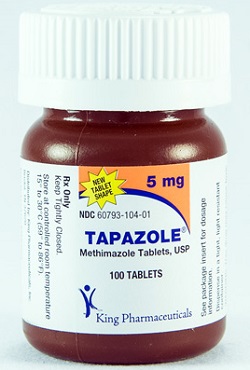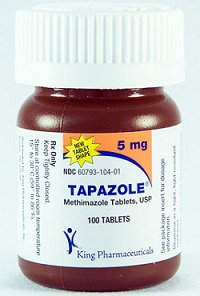Providing Quality & Trust || Clinic Website
Tapazole Tablet
No Info
Starting at $3.79
$3.79 Each
Detailed Description
TAPAZOLE TABLET
Generic Name & Formulations:
Methimazole 5mg, 10mg; scored tabs.
Company:
Tapazole is used to treat hyperthyroidism, or an overactive thyroid gland. Tapazole belongs to a class of drugs known as anti-thyroid agents. The thyroid hormone is responsible for regulating the body's metabolism. When the thyroid gland produces too much of these thyroid hormones, weight loss, abnormal appetite, and heart problems occur. Tapazole is used to treat cats only. It should not be used to treat dogs.
Key Benefits
- Rapid results
- Effectively treats hyperthyroidism in cats
- Lower incidence of adverse side effects than propylthiouracil
How it works
Hyperthyroidism is a condition that occurs when the thyroid gland produces too much thyroid hormone. Tapazole inhibits the production of thyroid hormones.
| Active Ingredient (per tablet) | Amount |
|---|---|
| Methimazole | 5 mg |
Other Ingredients:
Lactose Monohydrate, Magnesium Stearate, Starch (corn), Pregelatinized Starch and Talc.
Directions
The starting dose of Tapazole Tablets is 2.5 mg administered every 12 hours. Following 3 weeks of treatment, the dose should be titrated to effect based on individual serum total T4 (TT4) levels and clinical response. Dose adjustments should be made in 2.5 mg increments. The maximum total dosage is 20 mg per day divided, not to exceed 10 mg as a single administration.
Hematology, biochemistry, and TT4 should be evaluated prior to initiating treatment and monitored after 3 weeks and 6 weeks of treatment. Thereafter, bloodwork should be monitored every 3 months and the dose adjusted as necessary. Cats receiving doses greater than 10 mg per day should be monitored more frequently.
Cautions:
Keep out of the reach of children and pets. Tapazole should not be used in cats with known allergies to this drug. Do not use in cats that are pregnant or lactating. Do not give live vaccines while on Tapazole treatment. Blood tests must be done to check for correct dosage. Use caution in cats suffering from liver disease, immune system disease, or blood disorders. Use caution when administering Tapazole or when disposing of waste from cats taking Tapazole. Owners, especially pregnant women, should wear gloves when handling tablets or waste from cats taking Tapazole.
Side Effects:
Adverse reactions and serious side effects are rare, but in the case of an adverse reaction or a serious side effect you should stop Tapazole treatment and seek veterinary attention. Some common adverse reactions and serious side effects are facial swelling, breathing difficulties, hives, dark urine, jaundice, blood in urine or stool, easy bruising or bleeding, chills, blistering or peeling, skin rash, or unusual weakness.
Storage:
Store at room temperature away from moisture and heat.
Contraindications:
- Do not use in cats with hypersensitivity to Tapazole, carbimazole or the excipient, polyethylene glycol.
- Do not use in cats with primary liver disease or renal failure.
- Do not use in cats with autoimmune disease. See Adverse Reactions.
- Do not use in cats with hematological disorders (such as anemia, neutropenia, lymphopenia, or thrombocytopenia) or coagulopathies. See Adverse Reactions.
- Do not use in pregnant or lactating queens. Laboratory studies in rats and mice have shown evidence of teratogenic and embryotoxic effects of Tapazole.
Warnings:
Tapazole has anti-vitamin K activity and may induce bleeding diathesis without evidence of thrombocytopenia. See Adverse Reactions.
Human Warnings:
Not for use in humans. Keep out of reach of children. For use in cats only. Wash hands with soap and water after administration to avoid exposure to drug. Do not break or crush tablets. Wear protective gloves to prevent direct contact with litter, feces, urine, or vomit of treated cats, and broken or moistened tablets. Wash hands after contact with the litter of treated cats.
Methimazole is a human teratogen and crosses the placenta concentrating in the fetal thyroid gland. There is also a high rate of transfer into breast milk. Pregnant women or women who may become pregnant, and nursing mothers should wear gloves when handling tablets, litter or bodily fluids of treated cats.
Methimazole may cause vomiting, gastric distress, headache, fever, arthralgia, pruritus, and pancytopenia. In the event of accidental ingestion/overdose, seek medical advice immediately and show the product label to the physician.
Precautions:
Use of Tapazole Tablets in cats with renal dysfunction should be carefully evaluated. Reversal of hyperthyroidism may be associated with decreased glomerular filtration rate and a decline in renal function, unmasking the presence of underlying renal disease. Due to potentially serious adverse reactions such as hepatopathy, immune-mediated anemia, thrombocytopenia, and agranulocytosis, cats on methimazole therapy should be monitored closely for any sign of illness including anorexia, vomiting, head/facial pruritus or edema, depression/lethargy, weight loss, anemia, skin lesions, diarrhea, fever, or lymphadenopathy. If a cat becomes ill while on Tapazole Tablets, the drug should be stopped and appropriate hematological and biochemical testing should be done (see Animal Safety and Post Approval Experience).
Anticoagulants may be potentiated by the anti-vitamin K activity of Tapazole Tablets. Concurrent use of phenobarbital may reduce the clinical effectiveness of Tapazole Tablets. A reduction in dose of certain drugs (?-adrenergic blocking agents, digitalis glycosides, and theophylline) may be needed when the patient becomes euthyroid.
Methimazole is known to reduce the hepatic oxidation of benzimidazole anthelmintics (e.g. fenbendazole), leading to increased plasma concentration of these anthelmintics when administered concurrently. Tapazole Tablets caused delayed maturation of the testes in young male cats in the 12-week safety study. See Animal Safety. The safety of Tapazole Tablets has not been evaluated in male cats intended for breeding.
Indications
Tapazole are indicated for the treatment of hyperthyroidism in cats.

Powered by nopCommerce
This site is running in live payment mode. Real payments will be processed.

